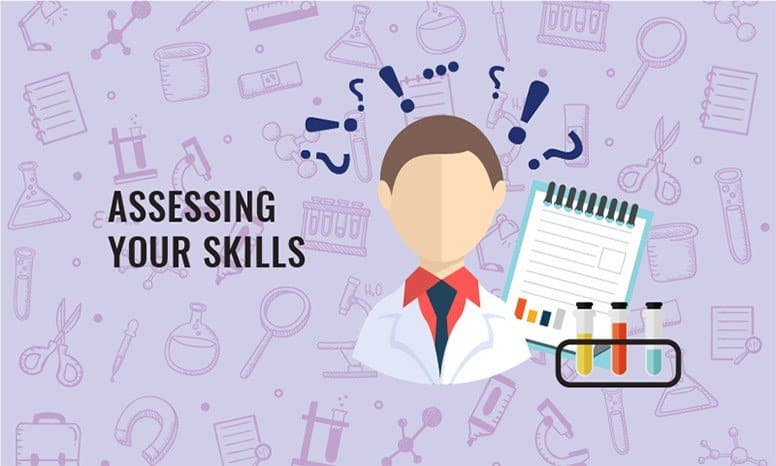Why Assessing Your Skills is Crucial to CV Writing & Interviews
By: Claire Wilson. Last Updated: Mar 2022

Assessing Your Skills
Content
- But Why do I Need to “Assess” my Skills?
- Step 1 – Write out every detail about your previous job
- Step 2 – Consider feedback you’ve been given previously
- Step 3 – Work with this list to find your transferable skills
- Step 4 – Add examples of success to your list
- Step 5 – Find examples that show you’ve faced a similar challenge before… and succeeded
- How to Use This in Applications
Click on a link above to jump straight to that section, or scroll down to read them all!
Assessing your skills should be one of the first things you do when you start a job hunt. If you don’t know the full list of skills you have, how can you expect an employer to see them? And if you don’t truly know the skills you have, how will you know which jobs you are suitable for?
Get beyond the responsibilities and duties of your previous roles and identify all your transferable skills.
But Why do I Need to “Assess” my Skills?
Being able to stand back and assess the skills you have can be one of the hardest things about writing a CV and interviewing.
To you, it’s just the job you did. It can be difficult to break it down into a set of skills that employers in a different industry could be interested in. You can easily be left feeling that your old career has nothing to offer you as you try to move forward in your new career.
That simply isn’t true.
But it isn’t until you can take a step back from the routine descriptions people often give about their jobs, that you can begin to identify your transferable skills. THAT’s why it’s an important exercise.
Transferable Skills
The ultimate aim of this exercise is to uncover the transferable skills you have. Once you’ve identified them, try to frame all of your communication in this way – whether it’s informal conversations, your CV or a formal job interview.
When this is done well, instead of talking to employers about the tasks you carried out in a previous job, you are talking to them about the skill set you have as a result.
While an employer might struggle to see how a role working as a cashier at a supermarket translates to their role if you talk about…
- communication skills (dealing with the public)
- how you had to learn a new IT system (the till) and did so will ease and confidence
- following health and safety protocols and team working (helping out colleagues in difficult situations)
…suddenly the role starts to seem more applicable.
It’s not about overstating your previous employment, it’s about framing it in a way that is relevant to the employer you are trying to attract.
To get started in assessing your own skills, get yourself a copy of our Skills Assessment template (you’ll find the link at the bottom of the page).
Now, here’s how you use that to assess the skills you already have…
Step 1 – Write out every detail about your previous job
Start with a previous role and write down all the things you did as part of that role. Consider every task and element of the job, no matter how small or routine it seems to you. It’s really about breaking things down into their most basic elements. To help, think about areas such as:
- Protocols you followed and how you reported
- Responsibilities you took on – examples of decision making or setting priorities
- Team working
- Leadership – staff management and supervisory responsibilities
- Opportunities you took to learn – courses and qualifications
- Other people you came into contact with – suppliers, customers, partner organizations
- How you communicated with other people – email correspondence, conference calls, running staff meetings
- IT systems used
- Analysis and problem-solving – did you spot a new way to do something? A process to streamline?
- Things you had to organize – systems you put in place or identifying new ways of doing things
- Troubleshooting or handling complaints
- Change management – showing you can adapt and thrive, adapting to new technology
- Time management and organization
Step 2 – Consider feedback you’ve been given previously
Consider any feedback you’ve had from others:
- When you’ve had appraisals or reviews, what were you told your strengths were?
- What have colleagues praised you for or commented on?
- What would people in the workplace ask for your advice or opinions about?
This will help you talk about areas where you have particular skills and strengths.
Step 3 – Work with this list to find your transferable skills
Once you have your list, take each point in turn and think of how to describe it using general “skills” words – communication, problem-solving, team working, etc. When your list is in this form, you’re well on the way to knowing what your transferable skills are.
Step 4 – Add examples of success to your list
It’s also extremely important that you can give specific examples of success.
If you can show an employer that you met the challenges offered in a previous role, they’re much more likely to be able to picture you succeeding in the job they’re recruiting for.
To do this, consider these points:
- Were you (or your department) set any targets to meet? How did you perform against them?
- If you didn’t have explicit targets, how was success measured in your role?
- What factors were taken into account at your appraisal or review?
Being able to give a tangible and specific measure of success against your transferable skills, helps them be more compelling to a potential employer.
Do this for each of the jobs you’ve had, at each of the companies you’ve worked for. And then consider doing it for any extracurricular activities you take part in if they have something new to offer.
Step 5 – Find examples that show you’ve faced a similar challenge before… and succeeded
As someone reskilling you should also have an acute awareness of finding examples of:
- Learning
- Adapting
- Thriving in new environments
- Seeking new skills and opportunities
It’s important that you can show a hiring manager that you have the capacity to take on something new and do well at it.
How to Use This in Applications
Once you have this diverse list of key transferable skills and points that demonstrate success, keep it and use it as a reference for each and every application.
For each new application:
- Read through the job advert and pick out the skills and experience they are asking for specifically – highlight these or make a note of them
- Refer to your previous list and pick out the skills, duties, and experiences from your previous roles that most closely match up against these specific requirements.
- These are the points you need to highlight to the employer.
- Within your CV you need to make these examples easy to find – do this by using the exact words and phrases used in the job advert, and by bringing them to the front of paragraphs and tops of bullet points lists.
- Make sure you keep a note of the points used for each application – if called for an interview, these are areas you should make sure you mention and discuss further.
Always remember that the person looking at your CV or interviewing you is unlikely to be familiar with the details of your previous roles. You can’t expect them to be able to find transferable skills from it if you can’t!
Learning how to lead people through your experiences, highlighting how they have given you the skills and capabilities you need for reskilling and being successful in this new industry is one of the most important skills you can develop in your job hunt. Get started on it today.
Download an Assessing Your Skills – Template
Other Useful Articles
You might also be interested in:
What Are The Minimum Requirements For A Career Change Into Pharmaceutical Manufacturing?
About the Author
Claire Wilson
Content Marketing and Career Coaching
Claire runs GetReskilled’s Advanced Career Coaching Programme – our specially devised job hunting course that helps our trainees take that final step into employment by leading them through the job hunting process. She is extremely enthusiastic about helping people reach their final goal of employment in their new career path.
Claire has a BSc (Hons) in Medical Biology from Edinburgh University and spent 7 years working in the pharmaceutical and medical device industries.
